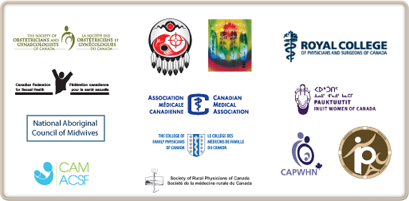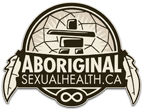Our Partners & Initiatives
Partnerships are essential to the goals of the Aboriginal Health Initiative. Promoting a culture of collaboration and working with Aboriginal and non-Aboriginal partners in both urban and rural areas, the SOGC engages in innovative, community-driven projects aimed at promoting health at all stages of women's lives. We are pleased to share with you some highlights from our projects, commitments and advocacy work.
Health Professionals Working with First Nations, Inuit and Métis consensus guideline
In 2001, the SOGC published an innovative guideline to give health practitioners a better understanding of how to provide culturally-safe care to Aboriginal Peoples throughout Canada. Ten years later, in partnership with the National Aboriginal Health Organization (NAHO) and with generous support from Nations and Inuit Health Branch (FNIHB) of Health Canada, we are advancing our guideline. Health Professionals Working with First Nations, Inuit and Métis consensus guideline provides up-to-date information on key topics such as demographics, health systems and policies, sexual and reproductive health and maternal and child health, in an effort to provide health professionals with the knowledge and tools to deliver culturally safe care to First Nations, Inuit and Métis women, and through them to their families.
Targeting women's health professionals including obstetricians, gynaecologists, family doctors, midwives and nurses, the guideline provides evidence-based recommendations, clinical tips, graphics and case study materials with key learning points. Additionally, a companion piece and infographic are available, highlighting key facts, tips and information in accessible language for distribution among First Nations, Inuit and Métis women, social services workers, health navigators, community health workers, cultural-liaison workers, health services researchers, policy analysts and other stakeholders.
Consultation and collaboration with Aboriginal organizations and medical organizations was a valued part of the development process. The guideline is endorsed by:
- Aboriginal Nurses Association of Canada
- Canadian Association of Perinatal and Women's Health Nurses
- Canadian Association of Midwives
- Canadian Medical Association
- College of Family Physicians of Canada
- Indigenous Physicians Association of Canada
- Inuit Tapiriit Kanatami
- Métis National Council
- Minwaashin Lodge
- National Aboriginal Council of Midwives
- National Aboriginal Health Organization
- Native Women's Association of Canada
- Native Youth Sexual Health Network
- Pauktuutit Inuit Women of Canada
- Royal College of Physicians and Surgeons of Canada
- Society of Rural Physicians of Canada
Joint Policy Statement: Sexual and Reproductive Health Rights, Realities and Access to Services for First Nations, Inuit and Métis People in Canada
In 2010, the SOGC teamed with the Assembly of First Nations (AFN), the Native Youth Sexual Health Network (NYSHN), Pauktuutit Inuit Women of Canada, and the Canadian Federation of Sexual Health (CFSH) to create a joint policy statement, affirming the sexual and reproductive health (SRH) rights of First Nations, Inuit and Métis (FNIM) women and youth.
Through this Statement, we aim to foster awareness about FNIM SRH rights and realities among health professionals, organizations and stakeholders across Canada, many of whom work with Aboriginal women and youth. We aim to support the delivery of culturally-safe care. This document also provides a common starting point, helping us move forward in the development of accessible, culturally-relevant public health materials and youth-driven, community-based projects to support improved SRH.

Endorsed by:
SOGC-AFN Youth & Sexual Health Community Project
Almost half of the Aboriginal community is under the age of 25. This is a young and growing population. At the SOGC, we aim to support a vibrant and healthy next generation. In order to achieve this, new initiatives are urgently needed to improve culturally-safe sexual and reproductive health (SRH) services for Aboriginal youth.
Taking a rights-based approach, the SOGC's Aboriginal Health Initiative is working with the Assembly of First Nations to develop strategies to address this health inequity through youth-driven, community-based projects. Our aim is to support activities that will reduce gaps in the availability and accessibility of SRH services between Canadian and Aboriginal youth.
Bringing Birth Back to the Community
Canada's maternity care environment is in crisis. There is a severe shortage of human resources, and women living in rural and remote areas, many of whom are Aboriginal, are routinely forced to leave their communities to give birth. New mothers experience stress, isolation, cultural disruption and associated health risks at a time when support is most needed.
Our goal is to bring birth back to the community. We aim to collaboratively forge a federal-provincial-territorial strategy that enables the delivery of high quality, culturally-safe obstetrical and midwifery services for low-risk Aboriginal women who choose to remain in their communities to give birth.
Click here to view our policy statement on Returning Birth
Adopted by SOGC Council and published in the JOGC!







